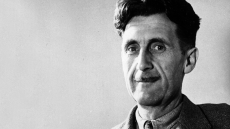
Email: EllaTournes@bexleygs.co.uk
Total Article : 45
About Me:Sixth form student currently studying English Literature, Drama and Theatre Studies, Classical Civilisation and History.

This difference indicates the contrasting attitudes the two societies have toward relationships – in ‘1984’, relationships of any kind are seen as a threat to the Party, so every person is forced to be an individual, whereas in ‘Brave New World’ people are seen as stronger when they work as a collective, as part of their caste. The use of slogans themselves link contextually to the Propaganda Huxley and Orwell would’ve experienced in World War I and, in Orwell's case, World War II. Orwell uses the word ‘contrived’ to describe the poster, implying an element of artifice about it. By including it in their dystopias, it is apparent that both Orwell and Huxley were disdainful of the concept of manipulation of the masses via war slogans or posters.
The presentation of both ‘the Director’ and ‘Big Brother’ allow both Huxley and Orwell to express their figures of authority, and in turn, their ideas about power. Both men are respected and revered – the Director is referred to as ‘the great man’ and has the students ‘following at his heels’, showing his status over them, and Big Brother’s face is described as ‘enormous’, implying his size and power. Noticeably, neither of the men in power have a real name at this point – the authors use the concepts of ‘brother’ and ‘director’ and manipulate them into proper nouns with capitalisation. This detaches them from the common man, and elevates them. Orwell goes a step further in the fact that Big Brother’s voice isn’t directly heard at the beginning of, or throughout the novel – nor does the reader ‘meet’ him at any point (unlike the Director, whose actual name is eventually revealed by Linda). This gives the character of Big Brother an ambiguity – it’s not made clear whether Big Brother is a fictional personification of the Party (much like the USA’s Uncle Sam, a personification of the American government), or whether he’s an actual person. The effect of this, is that Big Brother is deified – he is infallible, all-powerful. The deification of Big Brother bears resemblances to the deification of Joseph Stalin. The appearance of Big Brother also seems to link to Stalin – the iconic ‘heavy black moustache’, his age. By linking Big Brother to Stalin, Orwell gives a very real warning to his readers on the dangers of Fascism, making ‘1984’ contextually relevant.
Women, in the beginnings of these novels, are only significant in terms of their complete lack of representation. Orwell could be excused for this as he only introduces the character of Winston – Huxley, however, introduces a whole group of people and fails to mention anyone other than males – for example, the group of students that are being taught by the Director. The only mention Orwell makes of gender is the reference to ‘Big Brother’. The reference to an older male family member presiding over society could arguably be representative of a patriarchal system in the society of Oceania. The fact that Orwell features this patriarchy in his dystopia could be reflective of his critical views of it.

0 Comment:
Be the first one to comment on this article.